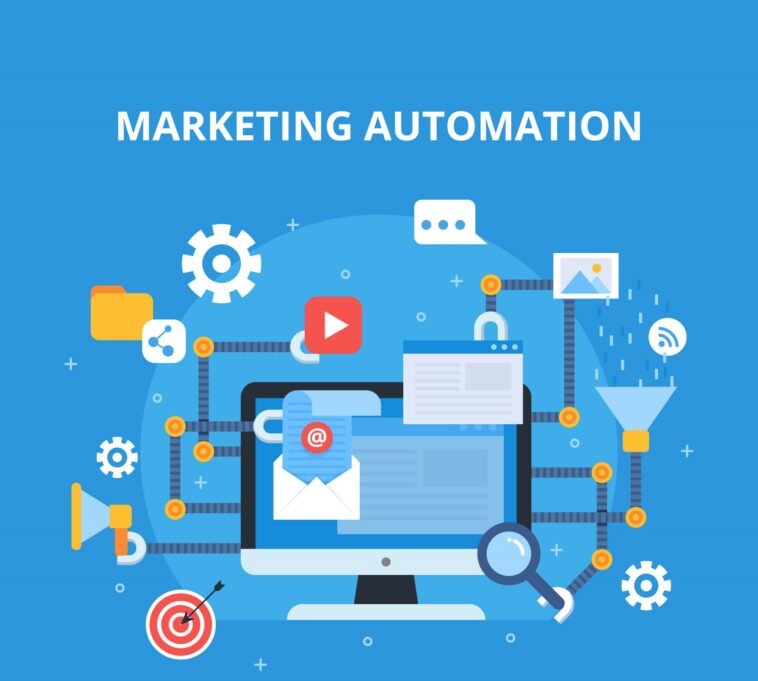In at this time’s fast-paced digital panorama, marketing automation has turn into a vital software for companies of all sizes. By automating repetitive advertising duties, companies can save time, enhance effectivity, and ship customized experiences to their clients. Whether or not you are seeking to enhance lead technology, nurture prospects, or improve buyer retention, advertising automation might help you obtain your objectives with much less effort and extra precision. On this complete information, we’ll discover what advertising automation is, the way it works, and how one can leverage it to optimize your advertising strategy.
What Is Advertising Automation?
Advertising automation refers to the usage of software program and technology to automate repetitive advertising duties and processes. These duties can embrace electronic mail advertising, social media posting, lead nurturing, buyer segmentation, and extra. The aim of selling automation is to streamline workflows, enhance buyer engagement, and in the end drive extra conversions and income.
Advertising automation platforms permit companies to create, execute, and measure advertising campaigns throughout a number of channels, all from a single platform. By automating routine duties, entrepreneurs can deal with extra strategic actions, resembling content material creation, marketing campaign planning, and analyzing efficiency information.
Key Advantages of Advertising Automation
Advertising automation affords a variety of advantages that may assist companies enhance their advertising efforts and obtain higher outcomes. Listed here are among the key benefits:
1. Elevated Effectivity
Automation frees up time by dealing with repetitive duties resembling sending emails, posting on social media, and monitoring buyer interactions. This permits your advertising staff to deal with extra strategic actions that require human creativity and perception.
2. Personalised Buyer Experiences
Advertising automation lets you ship customized content material and messages to your viewers primarily based on their habits, preferences, and stage within the purchaser’s journey. This stage of personalization can considerably enhance buyer engagement and conversion charges.
3. Improved Lead Nurturing
With advertising automation, you possibly can create automated workflows that nurture leads by means of the gross sales funnel. By sending the appropriate content material on the proper time, you possibly can construct stronger relationships with prospects and information them towards making a purchase order determination.
4. Higher Knowledge and Insights
Advertising automation platforms present detailed analytics and reporting, permitting you to trace the efficiency of your campaigns in real-time. These insights assist you to perceive what’s working, establish areas for enchancment, and make data-driven choices.
5. Scalable Advertising Efforts
As what you are promoting grows, so do your advertising wants. Advertising automation means that you can scale your efforts with out considerably rising your workload. You’ll be able to handle bigger audiences, run extra advanced campaigns, and keep consistency throughout all of your advertising channels.
6. Enhanced Buyer Retention
Advertising automation helps you keep related together with your clients even after they’ve made a purchase order. By automating follow-up emails, buyer surveys, and loyalty packages, you possibly can hold your clients engaged and encourage repeat enterprise.
How Advertising Automation Works
Advertising automation works by utilizing a mix of information, guidelines, and workflows to automate varied advertising duties. Right here’s an outline of the way it sometimes works:
1. Amassing and Segmenting Knowledge
Advertising automation platforms collect information from varied sources, resembling web site interactions, electronic mail responses, social media exercise, and CRM techniques. This information is then used to section your viewers into totally different teams primarily based on standards resembling demographics, habits, and buy historical past.
2. Creating Automation Workflows
Automation workflows are sequences of automated actions triggered by particular occasions or situations. For instance, you possibly can create a workflow that sends a welcome electronic mail to new subscribers, adopted by a collection of instructional emails over the subsequent few weeks. Workflows may be as easy or advanced as wanted, relying in your objectives.
3. Personalizing Content material and Messaging
With automation, you possibly can personalize your content material and messaging for every section of your viewers. This might embrace dynamic electronic mail content material that modifications primarily based on the recipient’s pursuits or customized product suggestions in your web site.
4. Executing Campaigns
As soon as your workflows are arrange, the advertising automation platform will execute your campaigns routinely. This consists of sending emails, posting on social media, updating CRM data, and extra. You’ll be able to monitor the progress of your campaigns in real-time and make changes as wanted.
5. Monitoring and Analyzing Efficiency
Advertising automation platforms present detailed analytics and reporting instruments that help you observe the efficiency of your campaigns. You’ll be able to see metrics resembling open charges, click-through charges, conversion charges, and ROI. These insights assist you to optimize your campaigns and enhance your general advertising technique.
Common Advertising Automation Instruments
There are a number of advertising automation platforms accessible, every providing a variety of options and capabilities. Listed here are among the hottest instruments:
1. HubSpot
HubSpot is a number one advertising automation platform that gives a variety of instruments for electronic mail advertising, social media administration, CRM, lead technology, and extra. It’s identified for its user-friendly interface and intensive instructional assets, making it an incredible alternative for companies of all sizes.
2. Marketo
Marketo, now a part of Adobe, is a strong advertising automation platform designed for enterprise-level companies. It affords superior options for lead administration, electronic mail advertising, analytics, and extra. Marketo is especially robust in its potential to combine with different Adobe merchandise and third-party purposes.
3. Mailchimp
Mailchimp is a well-liked electronic mail advertising platform that has expanded to incorporate advertising automation options. It’s an incredible alternative for small companies and startups attributable to its affordability and ease of use. Mailchimp affords instruments for electronic mail campaigns, social media advertising, touchdown pages, and extra.
4. ActiveCampaign
ActiveCampaign is a strong advertising automation platform that mixes electronic mail advertising, CRM, and automation into one platform. It’s identified for its superior automation capabilities and segmentation choices, making it best for companies seeking to create extremely customized campaigns.
5. Pardot
Pardot, a part of Salesforce, is a B2B advertising automation platform that focuses on lead technology, lead nurturing, and ROI reporting. It integrates seamlessly with Salesforce CRM, making it a well-liked alternative for companies already utilizing Salesforce merchandise.
Implementing Advertising Automation: Finest Practices
To get essentially the most out of selling automation, it’s vital to observe greatest practices that align with what you are promoting objectives. Listed here are some ideas for implementing advertising automation successfully:
1. Outline Clear Targets
Earlier than implementing advertising automation, outline clear objectives for what you need to obtain. Whether or not it’s rising lead technology, bettering buyer retention, or driving extra gross sales, having particular objectives will information your technique and assist you to measure success.
2. Begin Small and Scale Up
Advertising automation may be advanced, so it’s greatest to start out with easy workflows and steadily construct as much as extra superior automation. Start with fundamental duties, resembling sending automated welcome emails or organising deserted cart reminders, after which develop to extra intricate campaigns as you achieve expertise.
3. Give attention to Knowledge High quality
Correct and up-to-date information is crucial for efficient advertising automation. Make sure that your information assortment processes are dependable, and often clear and replace your database to keep away from points resembling duplicate contacts or outdated info.
4. Personalize, Don’t Generalize
One of many greatest benefits of selling automation is the flexibility to ship customized content material. Use the info and segmentation instruments accessible to create tailor-made messages that resonate together with your viewers. Keep away from sending generic messages that may very well be perceived as spam.
5. Take a look at and Optimize
Advertising automation shouldn’t be a set-it-and-forget-it resolution. Constantly take a look at totally different components of your campaigns, resembling topic strains, call-to-action buttons, and timing. Use A/B testing to match variations and optimize your workflows for higher efficiency.
6. Monitor Compliance
Make sure that your advertising automation practices adjust to related laws, resembling GDPR, CAN-SPAM, and CASL. This consists of acquiring correct consent for electronic mail advertising, offering straightforward opt-out choices, and safeguarding buyer information.
7. Align Gross sales and Advertising
Advertising automation works greatest when it’s aligned together with your gross sales efforts. Collaborate together with your gross sales staff to make sure that leads are being correctly nurtured and handed off on the proper time. Use automation to assist your entire buyer journey, from preliminary contact to post-purchase follow-up.
Challenges of Advertising Automation
Whereas advertising automation affords many advantages, it additionally comes with challenges that companies want to concentrate on:
1. Complexity
Advertising automation platforms may be advanced to arrange and handle, particularly for companies with restricted technical experience. It’s vital to take a position time in studying the platform and contemplate searching for assist from consultants if wanted.
2. Knowledge Administration
Managing and sustaining correct information is vital for efficient automation. Inconsistent or poor-quality information can result in ineffective campaigns and missed alternatives. Companies should prioritize information hygiene and use instruments that combine nicely with their present techniques.
3. Over-Automation
There’s a threat of over-automating your advertising efforts, which may result in impersonal interactions and alienate clients. It’s vital to strike a stability between automation and human contact, guaranteeing that your model stays genuine and customer-focused.
4. Preliminary Prices
Implementing a advertising automation platform can contain important upfront prices, particularly for small companies. Nevertheless, the long-term advantages typically outweigh the preliminary funding. It’s vital to finances accordingly and contemplate the potential ROI.
Conclusion: Elevate Your Advertising Technique with Automation
Advertising automation is a strong software that may remodel the way in which what you are promoting engages with clients, generates leads, and drives gross sales. By automating repetitive duties, personalizing buyer interactions, and leveraging data-driven insights, you possibly can streamline your advertising efforts and obtain higher outcomes with much less effort. Whether or not you are new to advertising automation or seeking to improve your present technique, the bottom line is to start out with clear objectives, implement greatest practices, and constantly optimize your campaigns. With the appropriate method, advertising automation could be a game-changer for what you are promoting.
FAQs About Advertising Automation
- What sorts of companies can profit from advertising automation?
Advertising automation can profit companies of all sizes and industries, from small startups to giant enterprises. It’s significantly helpful for corporations with advanced buyer journeys, a number of advertising channels, and a necessity for customized communication. - Can advertising automation substitute my advertising staff?
No, advertising automation is a software that enhances your advertising staff’s efforts. It handles repetitive duties and permits your staff to deal with technique, creativity, and relationship-building with clients. - How do I measure the success of my advertising automation efforts?
Success may be measured utilizing key efficiency indicators (KPIs) resembling conversion charges, lead technology, buyer engagement, and return on funding (ROI). Most advertising automation platforms supply analytics and reporting instruments to trace these metrics. - Is advertising automation costly?
The price of advertising automation varies relying on the platform and the options you want. Whereas there may be an preliminary funding, the effectivity positive factors and elevated income potential typically justify the expense. - How do I select the appropriate advertising automation platform?
Contemplate what you are promoting measurement, objectives, finances, and present instruments when selecting a advertising automation platform. Search for options that align together with your wants, resembling CRM integration, electronic mail advertising, social media administration, and analytics. Studying evaluations and requesting demos also can assist you to make an knowledgeable determination.
By embracing advertising automation, what you are promoting can ship extra focused, efficient advertising campaigns that drive outcomes and foster long-term buyer relationships. Begin exploring your choices at this time and take your advertising technique to the subsequent stage.


